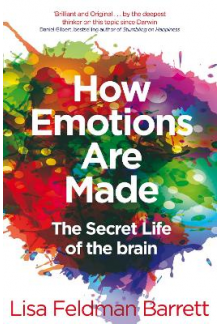- Titulinis
- Dalykinė ir mokslinė literatūra
- Socialinių mokslų knygos
- Psichologijos knygos
- How Emotions Are Made: The Secret Life of the Brain
Lisa Feldman Barrett
How Emotions Are Made: The Secret Life of the Brain
Balsavo 0
ISBN: 9781509837526
Autorius : Lisa Feldman Barrett
Leidimo metai: 2018
Leidėjas: Pan Macmillan
Puslapių skaičius: 448
Leidinio kalba: Anglų
Formatas: Minkšti viršeliai
Autorius : Lisa Feldman Barrett
Leidimo metai: 2018
Leidėjas: Pan Macmillan
Puslapių skaičius: 448
Leidinio kalba: Anglų
Formatas: Minkšti viršeliai
Pilna kaina:
12.00 €
- % perkant internetu
Kaina:
Šių parametrų produkto neturime
Likutis pakankamas
Pristatymas Lietuvoje per 3-5 savaitės. Galimas vėlavimas
Turime sandėlyje. Pristatymas Lietuvoje 1-4 d.d.
Pristatymas Lietuvoje per 3-5 savaitės. Galimas vėlavimas
Pristatymo sąlygos
Aprašymas
'How Emotions Are Made did what all great books do. It took a subject I thought I understood and turned my understanding upside down' - Malcolm Gladwell, author of The Tipping Point. When you feel anxious, angry, happy, or surprised, what's really going on inside of you? Many scientists believe that emotions come from a specific part of the brain, triggered by the world around us. The thrill of seeing an old friend, the fear of losing someone we love - each of these sensations seems to arise automatically and uncontrollably from within us, finding expression on our faces and in our behaviour, carrying us away with the experience. This understanding of emotion has been around since Plato. But what if it is wrong? In How Emotions Are Made, pioneering psychologist and neuroscientist Lisa Feldman Barrett draws on the latest scientific evidence to reveal that our common-sense ideas about emotions are dramatically, even dangerously, out of date - and that we have been paying the price. Emotions aren't universally pre-programmed in our brains and bodies; rather they are psychological experiences that each of us constructs based on our unique personal history, physiology and environment. This new view of emotions has serious implications: when judges issue lesser sentences for crimes of passion, when police officers fire at threatening suspects, or when doctors choose between one diagnosis and another, they're all, in some way, relying on the ancient assumption that emotions are hardwired into our brains and bodies. Revising that conception of emotion isn't just good science, Barrett shows; it's vital to our well-being and the health of society itself.
Atsiliepimai (0)
Palikite atsiliepimą

